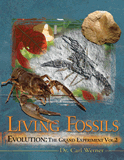
Fossil Finds Cause Little Change in Evolutionary History
ScienceDaily: “Evolution Rewritten, Again and Again” A new, overarching study of fossil discoveries reveals that most fossil finds cause little change in scientists’ view of evolutionary history. Why is that newsworthy for creationists?
The University of Bristol team conducting the study hoped to determine whether newly unearthed fossils tend to “rewrite evolutionary history,” as is often claimed. Likewise, creationists sometimes bemoan that one can’t trust evolutionary history as fact because it’s always changing.
“It might seem negative to say that new finds do, or do not, change our views.”
But with the exception of dinosaur fossils, evolutionary history rarely changes in response to a single fossil find, the team concludes. For the scientists, that’s a good thing. “It might seem negative to say that new finds do, or do not, change our views,” noted the university’s Michael Benton. “However, to find that they don’t means that we may be close to saturation in some areas, meaning we know enough of the fossil record in some cases to have a pretty good understanding of that part of the evolutionary tree.”
When it comes to dinosaurs, however, the team pointed out that new dinosaur excavations—in regions previously untouched by paleontologists, such as China—continue to overturn aspects of the evolutionary history of dinosaurs.
Of special interest, study leader James Tarver explained why, despite the perception, hominid fossils rarely upset existing literature: “Scientists may be pushed by their sponsors, or by news reporters, to exaggerate the importance of their new find and make claims that ‘this new species completely changes our understanding.’” His comment brings to mind the embarrassing flap over a fossil nicknamed Ida, reported with significant media fanfare last year. (We covered more of the scientific fallout last October and in March.)
Ultimately, it’s not particularly surprising that most fossils don’t change evolutionary history; such paleontological upheaval wouldn’t last long before scientists would be forced to be more circumspect. Further, fossils are typically described and interpreted with reference to “known” evolutionary history. For example, although fossils don’t come with tags stating their age, researchers quickly pin down an estimate of their age, often by referencing to other fossils. Finally, when creationists have complained that one can’t trust evolutionary history as fact because it’s always changing, the criticism has more to do with many evolutionists themselves than with the body of evolutionary history; by insisting that certain evolutionary hypotheses are “fact,” only to see them later overturned and repudiated, evolutionists lose their credibility.
For more information
Remember, if you see a news story that might merit some attention, let us know about it! (Note: if the story originates from the Associated Press, Fox News, MSNBC, the New York Times, or another major national media outlet, we will most likely have already heard about it.) And thanks to all of our readers who have submitted great news tips to us.
(Please note that links will take you directly to the source. Answers in Genesis is not responsible for content on the websites to which we refer. For more information, please see our Privacy Policy.)
Recommended Resources

Answers in Genesis is an apologetics ministry, dedicated to helping Christians defend their faith and proclaim the good news of Jesus Christ.
- Customer Service 800.778.3390
- © 2024 Answers in Genesis




